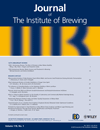
JOURNAL OF THE INSTITUTE OF BREWING
Scope & Guideline
Innovating the Future of Fermentation Science
Introduction
Aims and Scopes
- Brewing Science and Technology:
The journal emphasizes the scientific principles underlying brewing processes, including fermentation, mashing, and the role of various ingredients like barley, hops, and yeast. - Quality and Sensory Evaluation:
A core area involves the study of beer and spirit quality, encompassing sensory evaluation and consumer preferences, which helps brewers enhance product appeal. - Microbiology and Fermentation:
Research on microbial contributions to brewing, including yeast behavior, spoilage organisms, and fermentation kinetics, is a significant focus, reflecting the importance of microbiology in brewing. - Innovation in Brewing Techniques:
The journal supports innovative approaches in brewing technology, such as novel fermentation methods, enzyme applications, and equipment advancements to improve efficiency and product quality. - Sustainability and Resource Utilization:
Research on the utilization of brewing by-products, waste management, and sustainable practices in brewing highlights the journal's commitment to environmental stewardship.
Trending and Emerging
- Non-Alcoholic and Low-Alcohol Beers:
Research on non-alcoholic and low-alcohol beer production has gained traction, driven by consumer demand for healthier options and innovations in fermentation techniques. - Metabolomics and Flavor Profiling:
Emerging studies using metabolomic approaches to profile flavors and aromas in beers and spirits highlight the growing interest in understanding complex flavor compounds and their sources. - Sustainability in Brewing Practices:
There is a notable increase in research focused on sustainable brewing practices, including waste utilization and environmentally friendly production methods, reflecting broader industry trends towards sustainability. - Technological Innovations in Brewing:
The adoption of new technologies, such as CRISPR for yeast detection and advanced distillation techniques, shows a trend towards integrating cutting-edge science with traditional brewing methods. - Microbial Diversity and Its Impact on Flavor:
Increasing interest in the role of microbial diversity in fermentation processes underscores a trend towards understanding how different microorganisms influence flavor and quality in brewing.
Declining or Waning
- Traditional Brewing Practices:
Research on historical brewing methods and traditional practices appears to be waning, possibly as the industry shifts towards modern techniques and innovations. - Basic Ingredient Studies:
There seems to be a reduction in studies focused solely on basic ingredient characteristics (e.g., single-variety barley or hops), as the focus moves towards integrated studies involving complex brewing processes. - General Reviews without Novel Insights:
The journal may be receiving fewer general review articles that do not provide new insights or data, emphasizing a trend towards more original research contributions.
Similar Journals
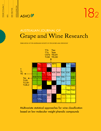
AUSTRALIAN JOURNAL OF GRAPE AND WINE RESEARCH
Advancing the Science of Viticulture and EnologyAustralian Journal of Grape and Wine Research, published by Wiley, is a premier academic journal dedicated to advancing knowledge in the field of viticulture and enology. With an impressive impact factor reflecting its significance, the journal is ranked in the Q1 quartile for Horticulture, placing it among the top-tier journals in its category, and enjoys a commendable ranking of #15/115 in Scopus for Agricultural and Biological Sciences. The journal has been serving the scientific community since its inception in 1995 and continues to be a vital resource for researchers, professionals, and students engaged in grape and wine research. Accessible through subscription, it provides a platform for publishing innovative research findings and insightful reviews that foster discourse in viticulture, wine quality, and sustainability practices. For anyone passionate about the science of grapevine cultivation and wine production, the Australian Journal of Grape and Wine Research is an indispensable source of knowledge and inspiration.

JOURNAL OF FOOD SCIENCE AND TECHNOLOGY-MYSORE
Exploring Innovations in Food Science Since 1974JOURNAL OF FOOD SCIENCE AND TECHNOLOGY-MYSORE, published by SPRINGER INDIA, is a distinguished peer-reviewed journal that has been contributing to the ever-evolving field of food science since its inception in 1974. With an ISSN of 0022-1155 and E-ISSN 0975-8402, this journal holds a commendable position in the Q2 category for Food Science, as per the 2023 metrics, and ranks #58 out of 389 in Scopus's Agricultural and Biological Sciences sector, achieving an impressive 85th percentile. The journal publishes high-quality research articles, reviews, and case studies that cover a wide array of topics, from food preservation to innovative technologies in food processing. Although it is not an open-access journal, it endeavors to disseminate essential knowledge and research strategies that advance food science and benefit both industry professionals and academia. The geographical reach of the journal, alongside its rigorous editorial standards, solidifies its stature as a pivotal resource for researchers, professionals, and students dedicated to the enhancement of food science practices and technologies.
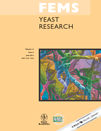
FEMS YEAST RESEARCH
Bridging Basic Research and Practical ApplicationsFEMS Yeast Research, published by Oxford University Press, is a leading academic journal dedicated to the study of yeast biology, focusing on various aspects such as physiology, genetics, and biotechnology applications. With an ISSN of 1567-1356 and an E-ISSN of 1567-1364, this journal serves as a vital resource for researchers, professionals, and students alike, fostering advancements in the field of applied microbiology and biotechnology. Recognized for its significant contributions, it holds a 2023 Q2 ranking in both Applied Microbiology and Biotechnology and Medicine (miscellaneous), reflecting its influence within the scientific community. Operating from its base in the United Kingdom, FEMS Yeast Research spans over two decades, with content converging from 2001 to 2024, and continues to disseminate innovative findings that underpin both basic research and practical applications. Researchers can explore cutting-edge studies, engage with expert opinions, and contribute to a growing knowledge base in yeast research, making this journal an indispensable tool for scientific inquiry and discovery in the microbiological landscape.
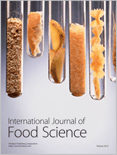
International Journal of Food Science
Unlocking Knowledge for a Healthier FutureThe International Journal of Food Science, published by HINDAWI LTD, stands as a crucial platform for advancing knowledge within the realm of food science. Established in 2013, this Open Access journal based in Egypt has garnered significant recognition, achieving an impressive Q2 classification in the 2023 Food Science category, which reflects its commitment to quality and impactful research. With a Scopus rank of #88 out of 389 in Agricultural and Biological Sciences and placing in the 77th percentile, this journal serves as an essential resource for researchers, professionals, and students dedicated to innovative developments and scientific exploration in food science. The journal not only provides unrestricted access to valuable research but also aims to foster collaboration and dissemination of knowledge on critical issues affecting food safety, nutrition, and technology. For those looking to keep abreast of the latest advancements, the International Journal of Food Science is certainly an indispensable addition to their academic pursuits.
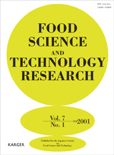
FOOD SCIENCE AND TECHNOLOGY RESEARCH
Elevating Standards in Food Safety and QualityFOOD SCIENCE AND TECHNOLOGY RESEARCH, published by the Japanese Society of Food Science & Technology, is a pivotal journal that encompasses a wide spectrum of research in the fields of food science, biotechnology, and engineering. With its ISSN number 1344-6606 and a digital counterpart E-ISSN 1881-3984, this journal aims to disseminate cutting-edge research and innovative technologies that enhance food safety, quality, and sustainability. Recognized for its contributions, it holds a Q3 category ranking in multiple disciplines, including Food Science and Biotechnology, indicating a significant role in advancing academic discourse. Researchers and professionals can benefit from its insights, as the journal covers an array of topics relevant to industrial applications, marketing strategies, and scientific advancements. Although not an open-access journal, it has a wide reach and is committed to providing high-quality, peer-reviewed content essential for scholars and practitioners in the food science community from 1999 to 2024.

Kvasny Prumysl
Connecting Researchers and Professionals in Brewing.Kvasny Prumysl is a distinguished open-access journal dedicated to the field of brewing science and technology, published by the Research Institute Brewing & Malting. Since its inception in 2019 as an open-access platform, Kvasny Prumysl aims to provide a comprehensive forum for researchers, professionals, and students in the brewing sector to share cutting-edge research, innovative methodologies, and significant advancements in brewing science. With an ISSN of 2571-3868 and an E-ISSN of 2570-8619, this journal fosters collaboration and knowledge exchange within the brewing community, contributing to sustainable practices and excellence in brewing. Based in Prague, Czech Republic, Kvasny Prumysl seeks to elevate its global presence, ensuring that the latest findings are accessible to all through its open-access model. The journal invites submissions through a rigorous peer-review process, reinforcing its commitment to high-quality research in the brewing industry.

OENO One
Exploring the Depths of Wine Science.OENO One, published by the International Viticulture and Enology Society (IVES), stands as a leading open-access journal dedicated to advancing the science of viticulture and enology since its inception in 2015. Operating out of France, this innovative journal is pivotal in disseminating high-quality research that impacts the fields of Food Science and Horticulture, evidenced by its notable category quartiles—Q2 in Food Science and Q1 in Horticulture as of 2023. With Scopus rankings placing it in the 82nd percentile in Horticulture and the 62nd percentile in Food Science, OENO One delivers timely insights and robust findings to its readers, fostering collaboration and knowledge exchange among researchers, professionals, and students alike. The journal embraces a forward-thinking approach, featuring research from various aspects of wine production, quality assessment, and viticultural practices, making it an essential resource for anyone involved in these disciplines.

Ukrainian Food Journal
Connecting researchers to transform food systems.Ukrainian Food Journal is an esteemed open-access journal dedicated to advancing the field of food science and biochemistry. Established in 2012 and published by the National University of Food Technologies in Ukraine, the journal serves as a vital platform for researchers and professionals to disseminate their findings on food technology, safety, and nutritional biochemistry. With an ISSN of 2304-974X and E-ISSN 2313-5891, it offers a wealth of knowledge to its readers, promoting innovation and collaboration within the industry. While currently categorized within the Q4 quartile of biochemistry and the Q3 quartile of food science, the journal is progressively gaining recognition, reflecting a commitment to quality research in a competitive field. The journal is indexed in Scopus, ranking #271 in Food Science and #376 in Biochemistry, underscoring its relevance and contribution to agricultural and biological sciences. The Ukrainian Food Journal not only enriches the academic community with its open-access model but also aims to foster dialogue among researchers, professionals, and students dedicated to improving food systems and nutrition. It operates from its headquarters in Kyiv, offering a hub for creativity and advancement in food-related research.
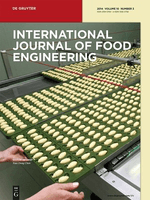
International Journal of Food Engineering
Elevating Food Systems with Cutting-Edge ResearchThe International Journal of Food Engineering, published by WALTER DE GRUYTER GMBH, serves as a pivotal platform for cutting-edge research in the field of food engineering. With an ISSN of 2194-5764 and an E-ISSN of 1556-3758, this journal focuses on innovative technologies, production processes, and quality control within food systems. Located in Germany, the journal has gained notable recognition, as reflected in its Scopus rankings, which place it within the 61st percentile in miscellaneous engineering and the 50th percentile in food science. Although it operates under a traditional access model, the journal's striking category quartiles signify its importance: achieving Q2 in Engineering and Q3 in both Biotechnology and Food Science in 2023. By fostering interdisciplinary research, the International Journal of Food Engineering aims to connect scientists, engineers, and industry professionals, ultimately contributing to advancements in food safety, sustainability, and nutrition. Join a vibrant community of experts driving innovation and addressing global food challenges through your contributions to this esteemed journal.
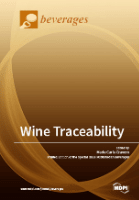
Beverages
Unveiling the Secrets of Sensory and Health InsightsBeverages is a premier open access journal published by MDPI, dedicated to the study of all aspects related to beverages, including their production, consumption, sensory properties, and health implications. Since its inception in 2015, the journal has established a notable presence in the field of Food Science, currently ranking in Q2 according to the latest 2023 category quartiles. With an ISSN of 2306-5710, it provides a platform for researchers, professionals, and students to share innovative research and insights that can advance the understanding and quality of beverage-related science. As an open access journal, Beverages ensures wide accessibility to its content, fostering collaboration and dissemination of knowledge across the global academic community. Based in Basel, Switzerland, the journal embodies a commitment to high-quality research and impactful contributions to the beverage industry and academia.